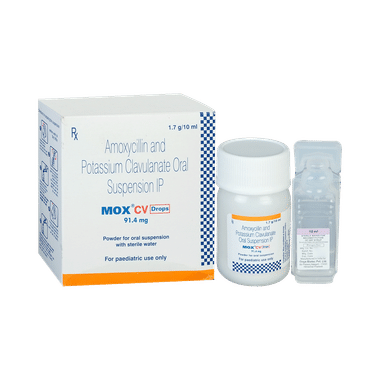-
Clamp Drop (Rs.170.39)
Composition: Amoxycillin (80mg) + Clavulanic Acid (11.4mg)
-
Cavmox-CV Drop (Rs.70.31)
Composition: Amoxycillin (80mg) + Clavulanic Acid (11.4mg)
-
Bactoclave Oral Drops (Rs.91.88)
Composition: Amoxycillin (80mg) + Clavulanic Acid (11.4mg)
-
Garclav Oral Drops (Rs.67.45)
Composition: Amoxycillin (80mg) + Clavulanic Acid (11.4mg)
-
Mega-CV Drops (Rs.83.44)
Composition: Amoxycillin (80mg) + Clavulanic Acid (11.4mg)
-
Novamox CV Drop (Rs.120)
Composition: Amoxycillin (80mg) + Clavulanic Acid (11.4mg)
-
Moxodin CV Oral Drops (Rs.80)
Composition: Amoxycillin (80mg) + Clavulanic Acid (11.4mg)
-
Moxclav Paediatric Drops (Rs.101.25)
Composition: Amoxycillin (80mg) + Clavulanic Acid (11.4mg)
-
Moxikind-CV Drops (Rs.97.96)
Composition: Amoxycillin (80mg) + Clavulanic Acid (11.4mg)
All Details About Mox CV 91.4mg Drop
Find out detailed description, uses, directions of use, side effects, warnings and precautions, frequently asked questions about Mox CV 91.4mg Drop
Description:
Mox CV 91.4mg Drop is an antibiotic medicine that helps treat bacterial infections of the ear, nose, throat, chest, lungs, teeth, skin, and urinary tract. It is prescribed by doctors based on the type and severity of the infection.You can give Mox CV 91.4mg Drop to your child with food. Mox CV 91.4mg Drop dose depends on the severity of the infection, its type, and your child’s body weight and age. So, stick to the dose, time, and way prescribed. Do not double-dose if it's time for the next dose.
Ordinary side effects of this medicine include vomiting, diarrhea, and nausea. These side effects should diminish on their own. But, in case they persist or start bothering your child, consult the doctor. They may be able to help prevent or reduce the side effects.
Share your child’s entire medical history with the doctor, including any previous episodes of allergy, heart problems, blood disorders, birth defects, airway obstruction, lung anomalies, gastrointestinal problems, skin disorders, liver impairment, and kidney malfunction. This information will assist the doctor in making dose alterations and planning your child’s overall treatment.
Directions For Use:
Take this medicine in the dose and duration as advised by your doctor. Check the label for directions before use. Measure it with a marked dropper and take it as directed. Mox CV 91.4mg Drop may be taken with or without food, but it is better to take it at a fixed time.Side Effects:
Mox CV 91.4mg Drop does not pose serious side effects and is well-tolerated by children. In case the side effects do occur, they’re likely to subside once the body adapts to the medicine. Consult your child’s doctor if these side effects persist or bother your child. The most common side effects include-Ordinary side effects of Mox CV
- Vomiting
- Nausea
- Diarrhea
Warning & Precautions:
Consult with your child’s doctor before giving Mox CV 91.4mg Drop to your child in case of a severe form of liver disease.
FAQs:
Can other medicines be given at the same time as Mox CV 91.4mg Drop?
Can I get my child vaccinated while on treatment with Mox CV 91.4mg Drop?
Which lab tests may my child undergo while taking Mox CV 91.4mg Drop on a long-term basis?
Can I give a higher dose than the recommended dose of Mox CV 91.4mg Drop to my child?
Can I stop giving Mox CV 91.4mg Drop to my child when the symptoms are relieved?
Can the use of Mox CV 91.4mg Drop cause diarrhea?
The mucus coming out of my child’s nose is yellow-green. Is it a sign of a bacterial infection?
Is there any sign that shows that my child needs immediate medical attention?
Written by:
Dr. T. Sharmila Krishna
M.B.B.S., MD (Biochemistry)
Reviewed by:
Dr. Sureshbabu Yadav
M.B.B.S., DIP.DIAB, F.R.S.H
Disclaimer:
Getomeds primary intention is to ensure that its consumers get information that is reviewed by experts, accurate, and trustworthy. The information and contents of this website are for informational purposes only. They are not intended to be a substitute for professional medical advice, diagnosis, or treatment. Please seek the advice of your doctor and discuss all of your concerns about any disease or medication. Do not disregard or postpone seeking professional medical advice because of something you read on Getomeds. Our mission is to support, not replace, the doctor-patient relationship.
